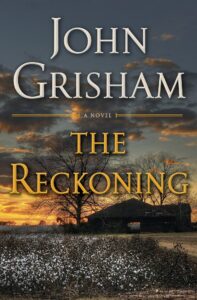In “The Reckoning,” John Grisham has not written a legal thriller; he has written a lean, plain-spoken, deviously straightforward Southern novel. And Grisham seems to have called in an unexpected set of co-authors.

For half of this book, set in his fictional Ford County, Mississippi, in the years just after the Second World War, Grisham uses a murder trial to follow the daily routine of cotton farming and small-town life. In this section, Grisham seems to be writing under the tutelage of Harper Lee, or perhaps sociologist John Dollard, who reported on Indianola in the Depression-era classic “Caste and Class in a Southern Town.”
For the rest of the book, which deals with World War II in the Pacific – the collapse of the Philippines, the hellish prison camps run by the Imperial Japanese Army, and the bitter guerrilla war that followed – Grisham seems to be working with different novelists. They may be the Norman Mailer of “The Naked and the Dead” or the Herman Wouk who wrote “War and Remembrance.”
In an afterword, Grisham offers a sketch of the puzzle that this book offers:
“Many years ago I served two terms as a state representative in the Mississippi Legislature. . . . At some point during my little career there, I heard the story of two prominent men living in a small town in Mississippi in the 1930s. One killed the other for no discernible reason, and he never offered a clue as to his motive. Once convicted and facing death by hanging, he turned down an offer from the governor to have his death sentence commuted if only he would divulge a motive. He refused and was hanged the next day on the courthouse lawn.”
Grisham’s epilogue accurately describes the mainspring of his plot. But ironically, and masterfully, while he seems to disclose everything, he actually gives nothing away.
“The Reckoning” opens in early October 1946, when war hero Pete Banning drives into town and shoots Reverend Dexter Bell, a Methodist minister. There is no discernible reason for the crime. Banning’s cotton plantation is prospering. He and his family attend Bell’s church. The men are friends. Over five years in town, Bell has built up an impeccable reputation. Bell finds his pastor writing a sermon, shoots him three times, tells a startled, scared janitor to find the sheriff, and waits to be arrested. His only comment on the shooting, as he repeats time and again, is “I have nothing to say.”
When a perpetrator kills a man, admits the killing, and offers no defense, the end of the story is grimly predictable. “The Reckoning” is a study in how the law takes its course.
In the second half of this book, Grisham looks back at Pete Banning’s early life, from his childhood in Ford County to the cruelties he endured in the Philippines. That sustained long view is part of the way that Grisham downplays his story of crime and punishment – and that panoramic view of the county community, stretching across landscapes and followed across seasons and years, is the most memorable part of the book.

While the mystery of motive resists solution, the people of Ford County plant and pick cotton, watch cotton prices, struggle with bad weather. Old people weaken; young people finish college, start careers, find other young people to marry. Distraught widows kill themselves, or remarry. Lawyers file motions and briefs and study the moves of opposing counsel. The novel ends in May 1950, after the murder trial and the appeals, after the lawsuits have been lost and won, after farmland has been transferred to pay judgments.
What “The Reckoning” offers is not the page-flipping suspense of a thriller. Rather, Grisham challenges the reader to hunt for the final, unknown element of the murder, Pete Banning’s undisclosed motive. Scanning the pages for a single fact hidden in plain sight proves just as intriguing as parsing scattered clues. There are no legal tricks here, no plot twists, no surprise endings. But the solution is there – and it is something that readers in Mississippi, like people in Ford County, should have known to see coming.
“The Reckoning,” by John Grisham. Doubleday, 2018. 420 pages. $29.95.
Allen Boyer is the Book Editor of HottyToddy.com. A native of Oxford, he lives and writes on Staten Island. His most recent book is “Rocky Boyer’s War” (Naval Institute Press).
Recent Comments